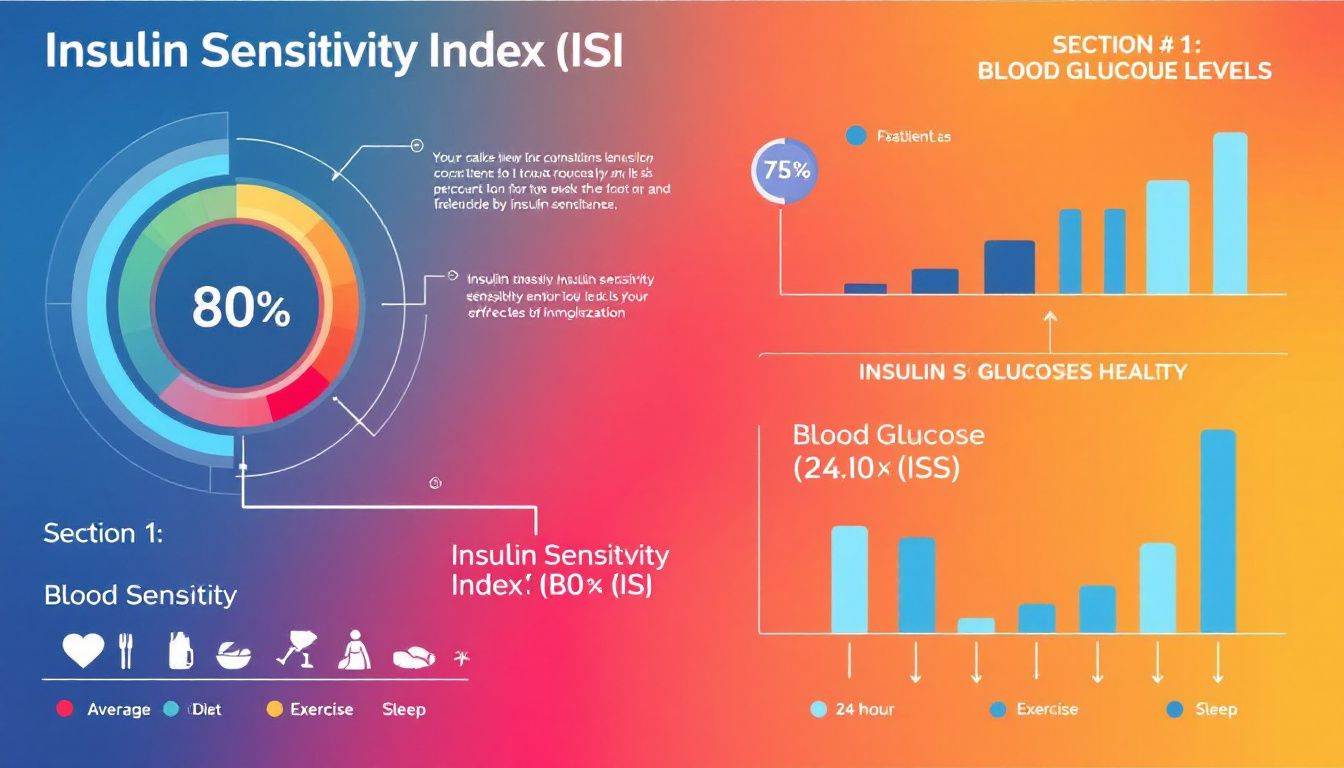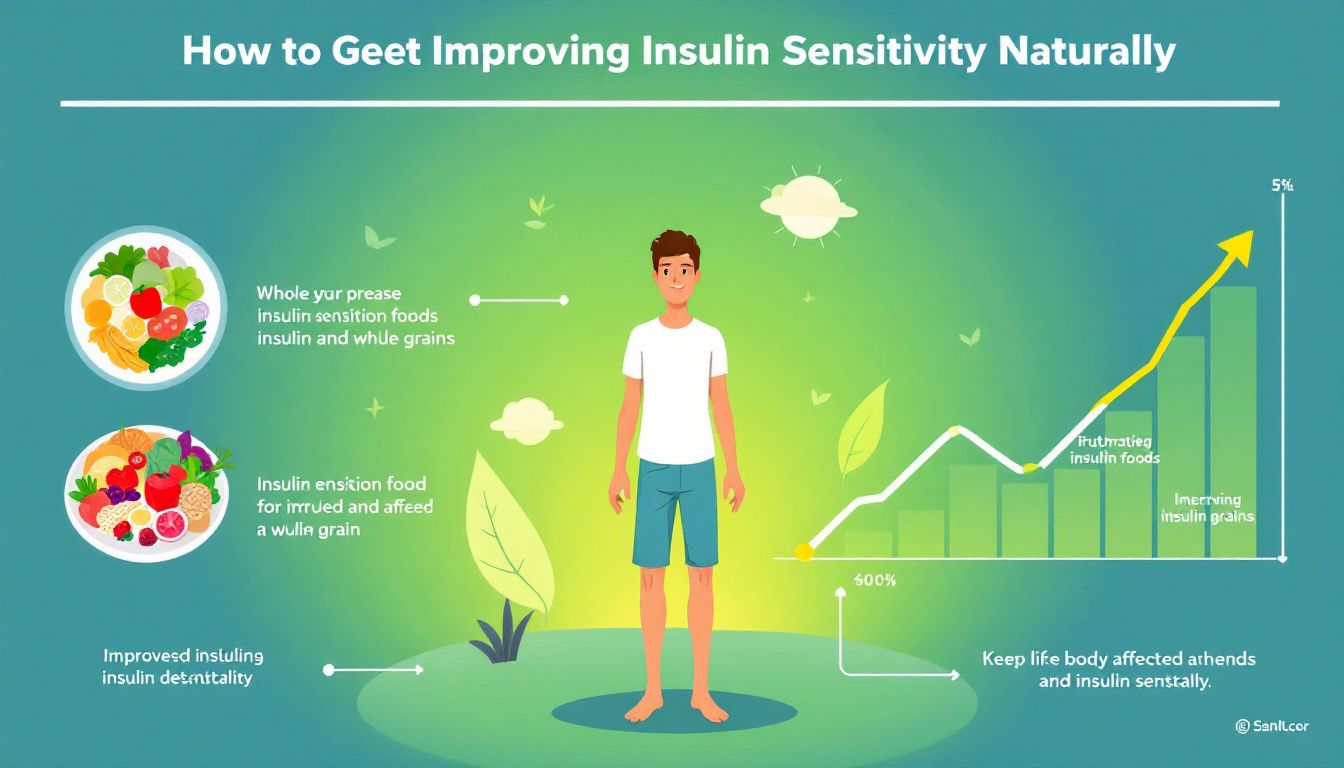An insulin sensitivity test measures how well your body responds to insulin, the hormone that regulates blood sugar. This test is crucial for identifying conditions like insulin resistance, which can lead to serious health issues such as diabetes if not addressed early. In this article, we’ll explain what the test involves, why it’s important, and how you can prepare for it. The National Institute of Diabetes and Digestive and Kidney Diseases (NIDDK) plays a key role in researching insulin sensitivity and related conditions.
Key Takeaways
The insulin sensitivity test assesses how effectively the body responds to insulin and helps identify insulin resistance early, preventing severe health issues such as diabetes.
Preparation for the test requires fasting for 10 to 12 hours and avoiding substances that may interfere with results, ensuring accurate assessments of metabolic health.
Lifestyle changes, including maintaining a healthy weight, regular exercise, and a balanced diet, can significantly improve insulin sensitivity and lower the risk of developing diabetes.
What is Insulin Sensitivity?
Definition of Insulin Sensitivity
Insulin sensitivity refers to the body’s ability to effectively use insulin, a hormone produced by the pancreas, to regulate blood glucose levels. When the body is insulin sensitive, it can efficiently absorb glucose from the bloodstream into cells, maintaining healthy blood glucose levels. Insulin sensitivity is crucial for preventing and managing conditions like insulin resistance, prediabetes, and type 2 diabetes.
Importance of Maintaining Healthy Blood Glucose Levels
Maintaining healthy blood glucose levels is essential for overall health and well-being. When blood glucose levels rise, the body’s cells become less responsive to insulin, leading to insulin resistance. Prolonged insulin resistance can cause blood glucose levels to remain elevated, increasing the risk of developing chronic diseases like diabetes, cardiovascular disease, and kidney disease.
Relationship Between Insulin Sensitivity and Insulin Resistance
Insulin sensitivity and insulin resistance are two sides of the same coin. When the body is insulin sensitive, it can effectively use insulin to regulate blood glucose levels. However, when the body becomes insulin resistant, it produces more insulin to compensate, leading to a range of health problems. Improving insulin sensitivity can help reverse insulin resistance and reduce the risk of developing related health conditions.
What is an Insulin Sensitivity Test and Glucose Tolerance Test?

The insulin sensitivity test evaluates how effectively your body responds to insulin, the hormone responsible for regulating blood sugar levels. This test evaluates how efficiently insulin helps glucose enter cells, offering insights into your body’s glucose control. When cells do not respond adequately to insulin, it can lead to insulin resistance, which negatively impacts blood sugar management.
Recognizing the results of this test helps identify potential issues early. Detecting insulin resistance allows for early intervention before it leads to more severe conditions like diabetes. The insulin sensitivity test is invaluable for maintaining optimal metabolic health.
Why You Might Need an Insulin Sensitivity Test
You might need an insulin sensitivity test for several reasons. Primarily, it helps in diagnosing insulin resistance, a condition where the body’s cells fail to respond properly to insulin. When cells can’t uptake glucose efficiently, it indicates insulin resistance, which can be detected through blood tests checking sugar levels. This condition is significant. Up to 50 percent of people with prediabetes may develop diabetes within 5 to 10 years.
Individuals with genetic or lifestyle risk factors are more likely to develop insulin resistance and benefit from this test. Those participating in diabetes prevention programs who maintain higher levels of insulin sensitivity demonstrate a lower progression rate to diabetes. Additionally, people with metabolic syndrome, which includes high blood pressure, abnormal cholesterol levels, and large waist size, are at high risk and should consider undergoing the test.
Early detection through this test can prevent the onset of type 2 diabetes mellitus and related health issues. Knowing your insulin and glucose levels allows you to take steps to control blood glucose levels or improve metabolic health.
Who Should Get the Insulin Sensitivity Test?
Individuals with a Family History of Diabetes or Insulin Resistance
Individuals with a family history of diabetes or insulin resistance should consider getting an insulin sensitivity test. This test can help identify early signs of insulin resistance, allowing for prompt intervention and prevention of related health conditions. Additionally, individuals with risk factors such as excess weight, physical inactivity, or a history of gestational diabetes should also consider getting tested.
How the Insulin Sensitivity Test Works

The insulin sensitivity test involves several common assessments, including the oral glucose tolerance test (OGTT) and fasting glucose/insulin ratios. The fasting plasma glucose test involves an eight-hour fast before measuring blood sugar levels. During the OGTT, you consume a glucose solution, and blood samples are taken at intervals to assess your blood sugar response, including results from the insulin test. Insulin tests are specialized procedures that require trained professionals and specific equipment in a laboratory setting.
These blood samples help determine how effectively your body processes sugar after ingestion. The blood test measures provide a detailed snapshot of how your body handles glucose, making it possible to identify any issues with insulin sensitivity early on. Knowing how these tests work can alleviate apprehensions and help you prepare.
Preparing for the Insulin Sensitivity Test
Proper preparation ensures the accuracy of the insulin sensitivity test. This typically includes fasting for 10 to 12 hours prior to the test. Good preparation significantly enhances the reliability of test results, paving the way for appropriate health interventions.
Pre-Test Requirements
Fasting before the test ensures reliable results. High-dose biotin supplements should be avoided for at least 24 hours before the test as they can interfere with the results. Refrain from medications that may affect insulin levels.
Avoid smoking, chewing gum, and using cough drops on the test day for accurate results. These pre-test precautions help in obtaining the clearest picture of your insulin sensitivity and overall metabolic health.
During the Test
During the insulin sensitivity test, a blood sample is drawn from a vein in your arm, which involves feeling a slight pinch from the needle insertion. Some individuals might experience mild discomfort or a sensation of pressure when the blood is being drawn.
Blood samples are taken initially and then every 30 minutes for two hours after consuming a glucose beverage. Knowing this process can help you prepare mentally and reduce anxiety.
Post-Test Care
After the test, there are typically no significant side effects, though slight bruising at the injection site may occur. It’s recommended to hydrate and resume normal eating unless otherwise directed.
Post-test care helps you recover quickly and maintain well-being.
Interpreting Insulin Sensitivity Test Results

Understanding test results involves recognizing what different levels indicate. 50% to 70% of women with PCOS exhibit insulin resistance, affecting their symptoms. Blood glucose levels rise due to poor cell response to insulin in insulin resistance. Hyperglycemia can occur when insulin production is insufficient or cells resist insulin, potentially leading to symptoms like increased thirst and fatigue.
Optimal fasting insulin levels are generally suggested to be between 2.55 and 18.4 μIU/mL, although this range may vary individually. A fasting insulin blood test should be paired with a fasting blood glucose level test to provide a comprehensive insight into metabolic health.
Conversely, hypoglycemia arises when insulin levels are excessively high or there is inadequate glucose for energy, resulting in symptoms such as dizziness and blurred vision, particularly in cases of low blood glucose. These results help guide informed decisions about your treatment plan.
Factors Affecting Insulin Sensitivity and Blood Glucose Levels
Lifestyle choices and genetic predispositions significantly affect insulin sensitivity. Excess weight and lack of physical activity are major contributors to insulin resistance. Obesity, stress, and aging also play significant roles, along with genetic factors.
Physical inactivity is linked to insulin resistance, while regular activity helps balance blood glucose levels. Eating habits, weight, and inflammation are other lifestyle risk factors that can contribute to developing insulin resistance.
Some contributing factors cannot be prevented or treated. Addressing modifiable risk factors significantly improves insulin sensitivity and reduces the risk of type 2 diabetes.
Improving Insulin Sensitivity Naturally

Several lifestyle changes can naturally improve insulin sensitivity. Key strategies include maintaining a healthy weight and regular exercise. Weight loss, especially around the abdominal area, can improve insulin sensitivity and lower diabetes risk. Regular exercise, especially 30 minutes several times a week, can quickly boost insulin sensitivity.
Incorporating more soluble fiber into your diet can promote a healthier gut microbiome, which is associated with better insulin sensitivity. Eating a variety of colorful fruits and vegetables may enhance insulin sensitivity due to beneficial plant compounds. Limiting carbohydrate intake, especially high-GI carbs, helps maintain stable blood sugar levels and promotes insulin function.
Reducing added sugars is crucial, as high sugar consumption often increases insulin resistance. Herbs, spices, green tea, and apple cider vinegar are associated with improved insulin sensitivity due to their bioactive compounds and antioxidants.
Medical Treatments for Insulin Resistance
Medical interventions may be needed for conditions like type 2 diabetes or metabolic syndrome, based on test results. Insulin and oral drugs commonly manage diabetes, tailored to each patient’s needs. Injectable medications, such as GLP-1 receptor agonists, help manage blood sugar levels and may aid in weight loss for type 2 diabetes patients.
Weight-loss surgery can be effective for those with obesity and type 2 diabetes to improve blood glucose levels. Pancreatic islet transplantation can provide new insulin-producing cells for patients with type 1 diabetes who struggle to manage their blood sugar levels.
Combining these medical treatments with lifestyle changes can significantly enhance insulin sensitivity and help to reverse insulin resistance.
The Role of Insulin Sensitivity in Preventing Diabetes

Insulin resistance and prediabetes can increase the risk of developing type 2 diabetes. Early identification of insulin resistance in conditions like PCOS can lower the risk of diabetes and cardiovascular diseases. Chronic high insulin levels increase the risk of health conditions like type 2 diabetes and cardiovascular disease.
A healthy weight, regular exercise, and nutritious foods improve insulin sensitivity. Reducing body weight by 5% to 7% greatly lowers the risk of developing diabetes. Such a weight loss can have a positive impact on overall health. Elevated levels of both fasting insulin and glucose may signal insulin resistance, necessitating lifestyle changes or medical intervention.
Summary
Understanding and managing insulin sensitivity is crucial for preventing serious health conditions like type 2 diabetes and cardiovascular diseases. Through lifestyle changes, such as maintaining a healthy weight, regular exercise, and dietary adjustments, you can significantly improve your insulin sensitivity.
Early detection through an insulin sensitivity test can guide appropriate interventions, whether they be natural strategies or medical treatments. By taking proactive steps to manage your health, you can ensure a better quality of life and prevent the onset of debilitating diseases.
Frequently Asked Questions
What is the purpose of an insulin sensitivity test?
The insulin sensitivity test serves to assess the body’s responsiveness to insulin, which is essential for effective blood glucose management. Understanding this sensitivity helps in diagnosing and managing conditions like insulin resistance and diabetes.
Who should consider taking an insulin sensitivity test?
Individuals with genetic or lifestyle risk factors, those diagnosed with prediabetes, and participants in diabetes prevention programs should strongly consider taking an insulin sensitivity test. This can help assess their risk of developing diabetes or other metabolic disorders.
How do I prepare for an insulin sensitivity test?
To prepare for an insulin sensitivity test, you should fast for 10 to 12 hours, avoid high-dose biotin supplements, and refrain from smoking or chewing gum on the day of the test. Following these steps will help ensure accurate results.
What can I expect during the insulin sensitivity test?
During the insulin sensitivity test, you can expect to have blood samples drawn at intervals after consuming a glucose solution, which may cause mild discomfort or pressure at the site of the blood draw.
How can I naturally improve my insulin sensitivity?
To naturally improve your insulin sensitivity, focus on maintaining a healthy weight through regular exercise and a balanced diet rich in soluble fiber, fruits, and vegetables while minimizing added sugars. These lifestyle changes can lead to significant improvements in your overall health.
